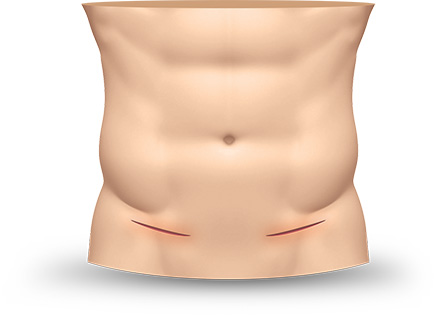What is Hernia ? Types of Surgery for hernia
HERNIA REPAIR
HERNIA
OPERATION, REPAIR SURGERY, TREATMENT
Hernia :
A hernia occurs in the abdomen when a part of tissue or an organ comes out through one of the weakened muscle walls that surround the abdominal cavity.
Hernia can appear in the
groin areas, belly button, and upper thighs. In most cases, hernias are not
life-threatening, but they don’t go on their own. They might require hernia
operation or hernia surgery to prevent potentially hazardous complications.
Redkar Hospital &
Research Center is the best hospital for hernia surgery in Goa. Our hernia
specialist has years of experience in hernia treatment.
Common Types of Hernia
There are mainly four types of hernias
affecting the humans
1. Inguinal Hernia:
It is one of the most common types of hernia making up to
75%. Inguinal hernias arise when the intestines tear or push through the weak
spot in the lower abdominal wall, mostly in the inguinal canal.
In men, inguinal canal found in the groin where the
spermatic cord passes to the scrotum from the abdomen. In women, the inguinal
canal holds the ligament that helps seize the uterus in place.
Men are affected more with an inguinal hernia than women
because their testicles are descended through the inguinal canal right after
they are born. Thus, men undergo inguinal hernia treatment as a resolution.
2. Hiatal Hernia
This type of hernia occurs when a piece of your stomach
tissue sticks out through your diaphragm into your chest cavity. A hiatal
hernia is a common disorder amongst individuals aged 50 and above.
3. Umbilical Hernia & Paraumbilical hernia
Most commonly seen among women, herniation
occurs through weakened umbilical cicatrix. Along with fat, small bowel &
large bowel can also get obstructed in this hernia.
4. Incisional Hernia
An incisional hernia occurs after you have
undergone an abdominal surgery.
Signs and Symptoms of Hernia
The most common sign of
hernia occurrence is the formation of lump or bulge in the affected area. In
case of an inguinal hernia, you may notice bulginess on either side of your hip
bone where your thigh and groin meet. You can feel your hernia by touching
during when you bend down, cough, or stand up.
signs and symptoms of an inguinal hernia :
·
Aching,
gurgling, at the site of the lump
·
Experiencing
heaviness, pressure, or weakness in the abdomen
·
Discomfort
or pain in the affected area while lifting, coughing, or bending
signs and symptoms of a hiatal hernia:
·
Difficulty
in swallowing
·
Chest
pain
·
Acid
reflux
signs and symptoms of an umbilical
hernia:
·
Your
baby might have a hernia is he/she has a bulge near the belly button
Diagnosis of Hernia
The best doctor for
hernia will make sure to perform all the tests and diagnosis to determine the
type of hernia in the patients.
· Incisional or inguinal hernias are
diagnosed via a physical examination
·
Hiatal
hernia is diagnosed using endoscopy or CT scan
·
Umbilical
hernia is diagnosed using ultrasound
Further, a CT scan or MRI
is also performed for diagnosing a hernia
Hernia Repair Surgery, Operation and
Treatment
Open / Laparoscopic hernia repair
surgery is considered the best treatment option for hernia. However, it will depend on the symptoms and the
size of your hernia to determine the treatment options.
The possible treatment options for hernia
include:
·
Surgery / Operation
You will require an inguinal hernia surgery / operation
if your hernia is causing pain or is growing larger. It involves miniaturized
surgical equipment and a tiny camera along with few small incisions.
Strengthening of abdominal wall muscles is done using a
mesh made from synthetic material. After operation, hospital stay is short
& patient can return to daily activities within a week.
At discharge patient is advised to avoid straining during
urination / defecation and also avoid lifting heavy objects or gym activities.
Medication
Hiatal hernias can be treated using certain prescribed
medications that condense the stomach acid. Proton pump inhibitors, H2 receptor
blockers, and antacids are the potential medicines for hiatal hernias. But in severe symptomatic hernias will require surgery known as fundoplication.






.jpeg)
Comments
Post a Comment